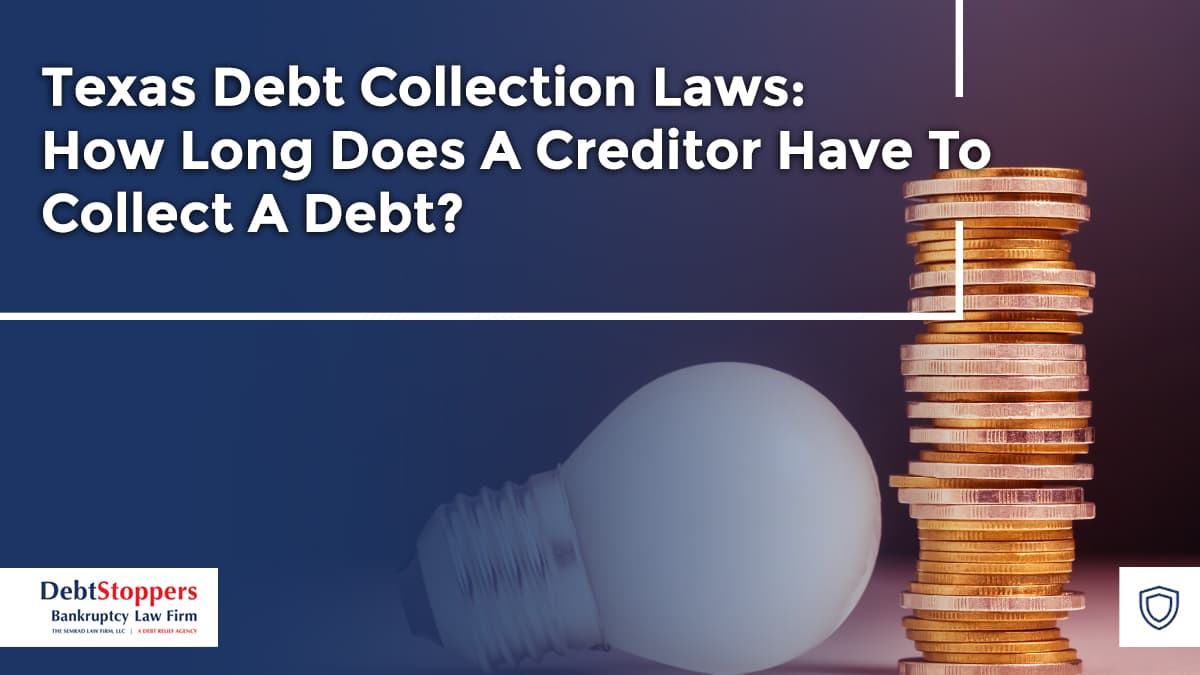Texas Debt Collection Laws: How Long Does A Creditor Have To Collect A Debt?

If you are being harassed by debt collectors, you may be wondering if this will last forever. The good news is that there is a statute of limitations on debt collection, and once that expires, you cannot be sued for that debt.
It’s important to understand your rights and avoid making a costly mistake that could revive old debt or restart the clock on the statute of limitations.
Is there a statute of limitations on debt collection?
Yes, there is a statute of limitations on debt collection. After the statute of limitations expires, the debt is considered time-barred, and the creditor cannot sue you to recover that debt.
Statute of limitations on debt collection in Texas
In Texas, the statute of limitations for most consumer debt is four years. Consumer debt includes credit card debt, medical bills, and personal loans.
Simply put, in Texas, creditors have four years to file a lawsuit against you to collect debt - after that, the creditor cannot sue you for that debt.
It’s important to know that even though a creditor cannot sue you after the statute of limitations has passed, it doesn’t mean the debt is gone or forgiven. The creditor may still try to collect the debt, but they cannot sue you.
It is beneficial to track the statute of limitations on your debt and avoid making a mistake that would reset the clock.

When does the statute of limitations start?
To successfully track the statute of limitations on your debt, it’s important to understand exactly when the statute of limitations starts. Simply put, the statute of limitations starts on the date of the last payment or the date the debt was last acknowledged.
This is important to understand because debt collectors are savvy and may try to get you to make a small payment or even just acknowledge the debt if the time is running out on the statute of limitations. If you make a small payment or acknowledge the debt, they can restart the statute of limitations and will be able to file a lawsuit against you for that debt.
We’ve heard countless stories of people who get contacted right before the statute of limitations expires. The debt collector makes them feel guilty for the debt and encourages them to make a small payment. If the person makes any payment, the clock starts over. Don’t fall for this trick. Debt collectors track the statute of limitations on your debt, and so should you.
Likewise, even acknowledging the debt can restart the clock, so be careful what you say or send in writing. The debt collector can use anything you say or write against you. Knowledge is power, and if you are savvy about their tricks and your rights, you’ll be in a better position to protect yourself.
What happens after the statute of limitations expires?
When the statute of limitations expires, the debt is considered time-barred, and the creditor or debt collector loses the ability to file a lawsuit to collect the debt. However, it’s important to know that they will likely still continue collection efforts.
Even after the statute of limitations expires, you should not acknowledge the debt to avoid accidentally reviving the debt. You should be extremely cautious when communicating with debt collectors to avoid reviving the debt and resetting the clock on the statute of limitations.
Accidentally reviving the statute of limitations can have a big impact and come with serious financial consequences. In addition to opening you up to potential lawsuits, you can also face wage garnishments or bank levies.
It’s important to track the time of your debt in regard to the statute of limitations, especially for debt that is close to expiring or has recently expired. A simple mistake can be very costly so make sure to keep good records and if you have questions, call an attorney and schedule a free consultation.

Overview of the debt collection laws in Texas
In Texas, consumers are protected from unfair or abusive practices by both federal and state laws. Creditors have the right to recover debt, but there are numerous limitations and exemptions that protect you.
The Federal Protections: The Fair Debt Collection Practices Act (FDCPA) prohibits debt collectors from threatening or harassing people. Debt collectors are also required to identify themselves and cannot call you before 8:00 AM or after 9:00 PM. Additionally, debt collectors are not allowed to falsely threaten legal action or lie about the amount of debt you owe. These are important rights that apply across the nation.
Texas also has additional consumer protection laws that apply to creditors and third-party debt collectors. The Texas Debt Collection Act forbids creditors or third-party debt collectors from making false accusations, threatening violence, or arrest.
In Texas, you are protected by some of the strongest wage garnishment protections in the nation. In Texas, generally, your wages are protected from garnishment for all consumer debt including credit cards, personal loans, and medical bills.
Specifically, wage garnishment is only allowed for federal student loan debt, tax debt, child support, and court-ordered restitution from a criminal case. Texas also has generous exemptions and asset protection laws. In general, your primary residence is exempt, regardless of the value. Your retirement accounts, life insurance policies, and social security benefits are also protected.
In Texas, if you are contacted by a debt collector, you have the right to request written verification of the debt. You have 30 days to dispute the debt, and you also have the right to send a cease-and-desist letter to stop future contact.
While Texas provides generous exemptions and consumer protection laws, it’s important to make sure your rights are protected. These laws are complex and can get confusing quickly. If you have questions or are dealing with debt collectors in Texas, a bankruptcy attorney can help you understand your options and ensure your rights are protected.





